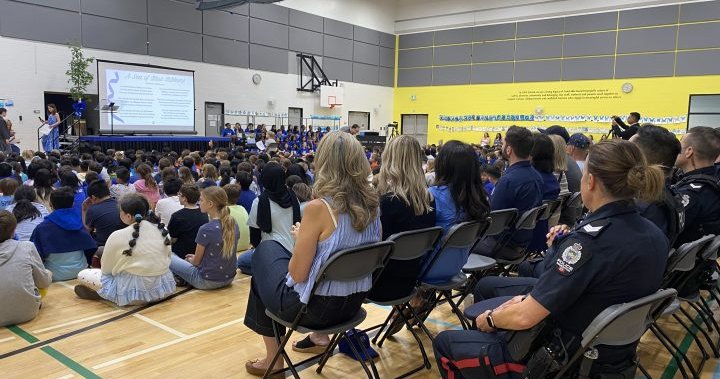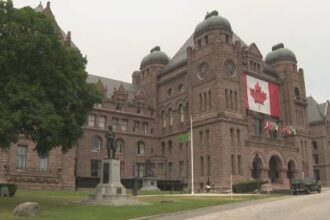In a poignant ceremony marked by reflection and gratitude, students and staff at Constable Daniel Woodall School gathered Thursday to honor the fallen Edmonton police officer on the 10th anniversary of his death. The tribute showcased how Woodall’s legacy continues to inspire the next generation, transforming a tragedy into enduring lessons of courage and community service.
“It’s incredible to see how much he still means to this community,” said Principal Leona Gordey, watching as students placed handmade cards and artwork around a memorial bench dedicated to Woodall. “These children weren’t even born when Constable Woodall made the ultimate sacrifice, yet they understand the importance of his service and what he stood for.”
Constable Woodall, a hate crimes investigator with the Edmonton Police Service, was fatally shot on June 8, 2015, while attempting to serve an arrest warrant in west Edmonton. The 35-year-old officer, originally from Manchester, England, left behind his wife Claire and two young sons.
The school, which opened in 2017 in the Windermere neighborhood, stands as a living memorial to Woodall’s sacrifice. Throughout the building, displays highlight the officer’s commitment to combating hate and promoting inclusivity—values that have become central to the school’s educational philosophy.
During Thursday’s ceremony, Edmonton Police Chief Dale McFee addressed the assembled students, emphasizing how Woodall’s legacy extends far beyond his police work. “Constable Woodall protected our community from hate. Every day, when you come to this school named in his honor, you have the opportunity to continue his important work by treating others with kindness and respect.”
The event featured the unveiling of a new memorial garden where students will plant flowers annually to ensure Woodall’s memory continues to flourish. Fourth-grade students performed a specially composed song, while others read poems they had written reflecting on courage and service.
Claire Woodall, who attended with her sons, expressed profound appreciation for the school’s ongoing commitment to preserving her husband’s memory. “Daniel would be incredibly touched to see how his legacy lives on in these children,” she said. “The fact that they’re learning about tolerance and standing up against hate—that’s exactly what he dedicated his career to.”
For many Edmonton officers who worked alongside Woodall, the school represents the positive that emerged from tragedy. Sergeant Michael Elliott, who served with Woodall, noted: “When something this tragic happens, it leaves a wound in the community. This school has helped heal that wound by creating something beautiful and lasting.”
The tribute concluded with the school’s 700 students forming a human chain around the building—a symbolic gesture of protection and community solidarity that echoed Woodall’s own commitment to safeguarding others.
As Edmonton reflects on this somber anniversary, the question remains: How might Constable Woodall’s dedication to fighting hate and protecting the vulnerable inspire not just these students, but all citizens to build more compassionate communities?
























